Letter from Arthur Seaforth Blackburn to his family, 1941 - Part 3 of 3
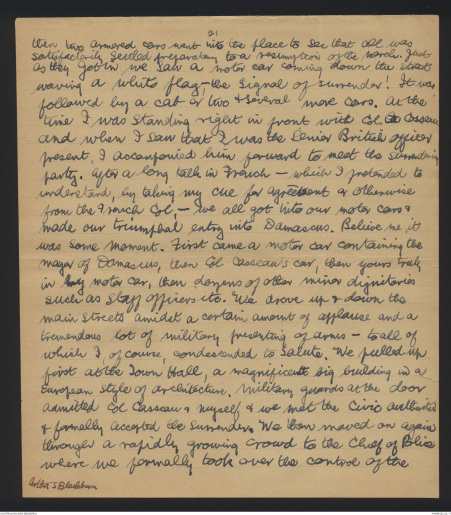
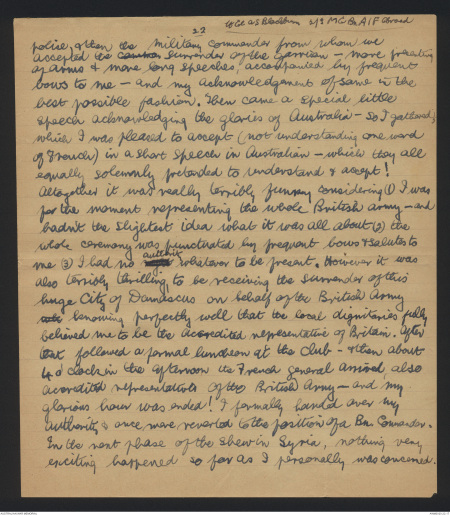
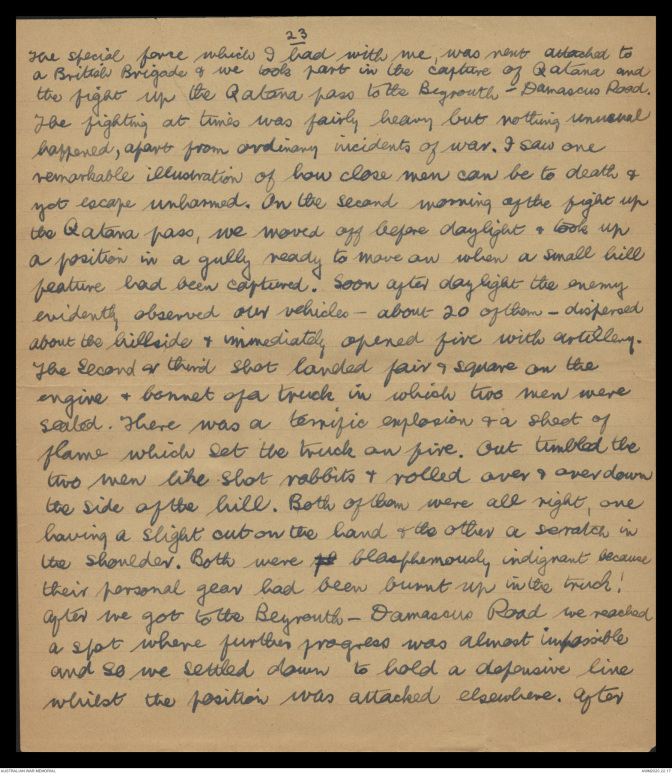
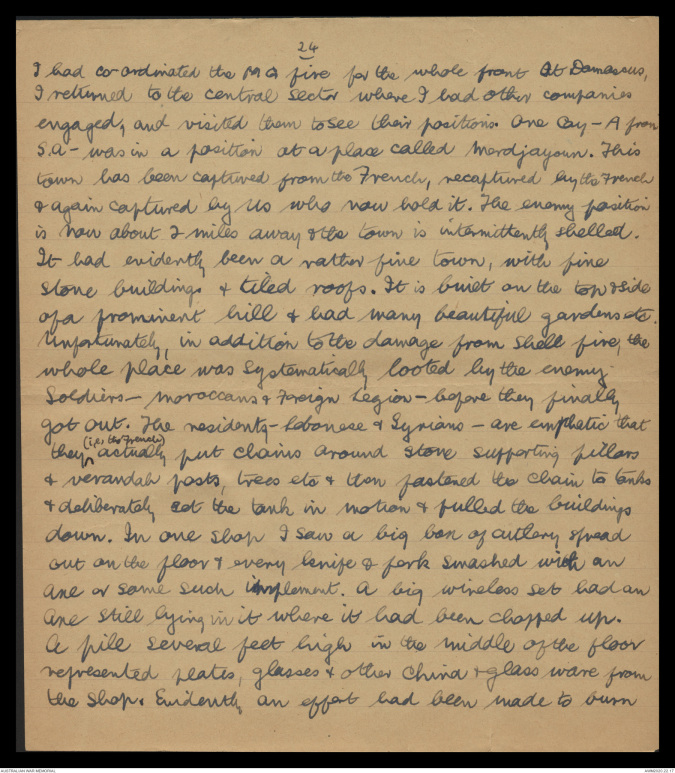
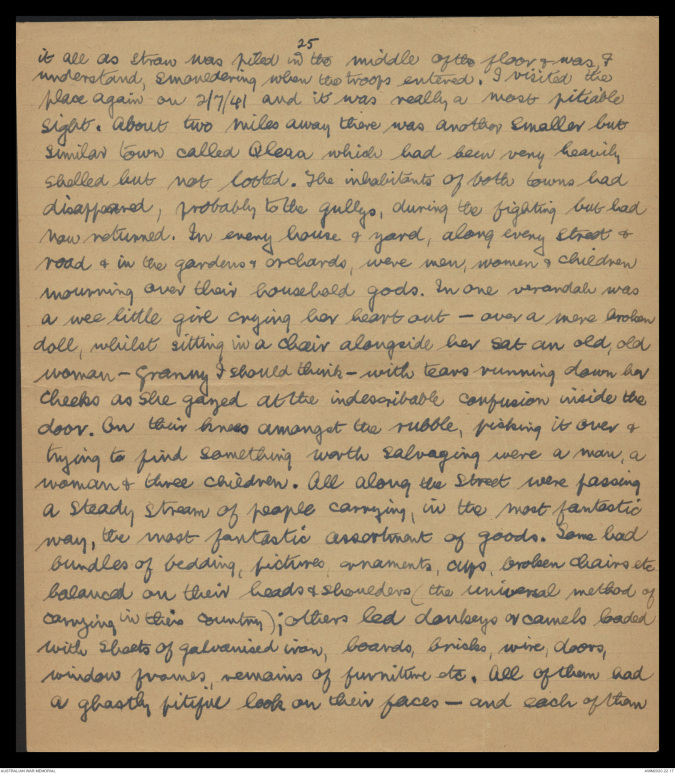
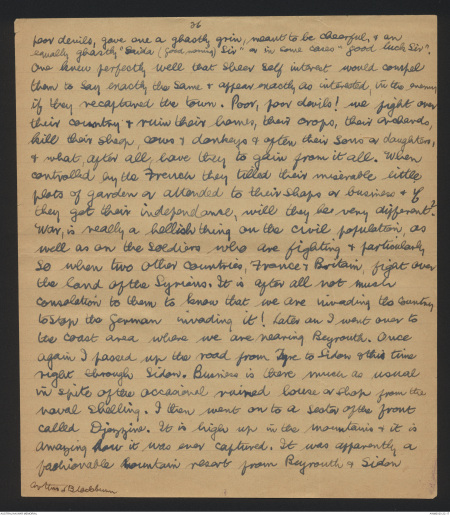
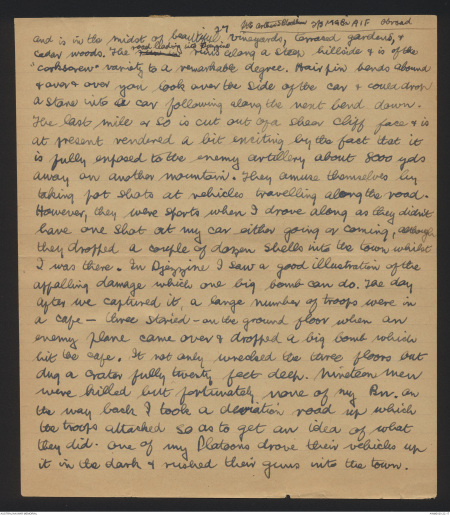
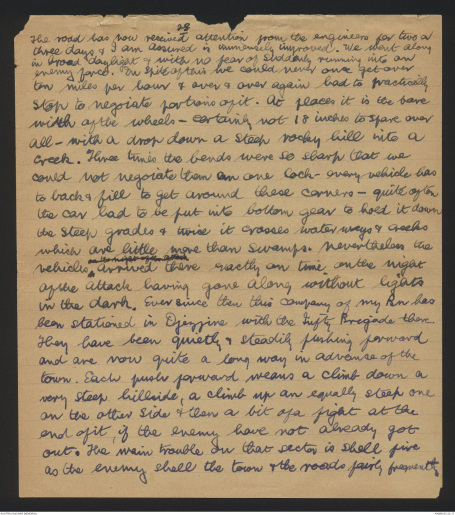
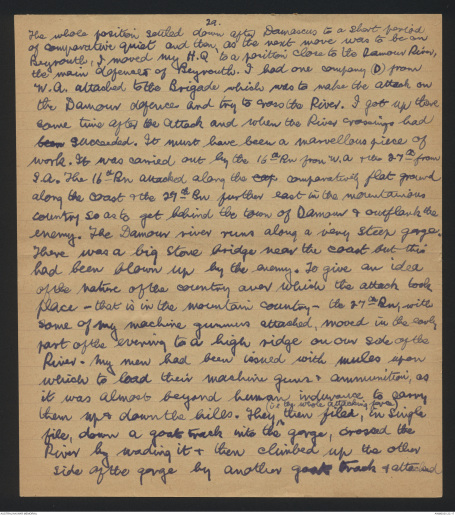
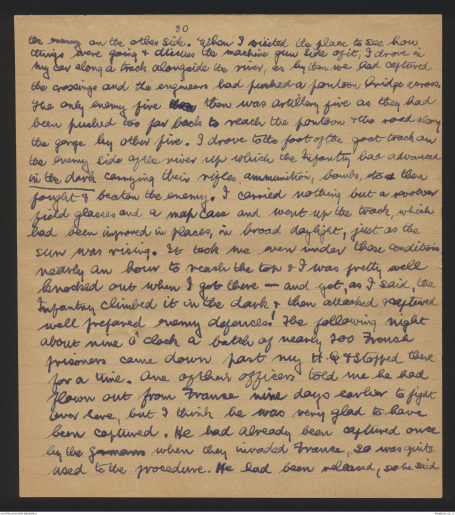
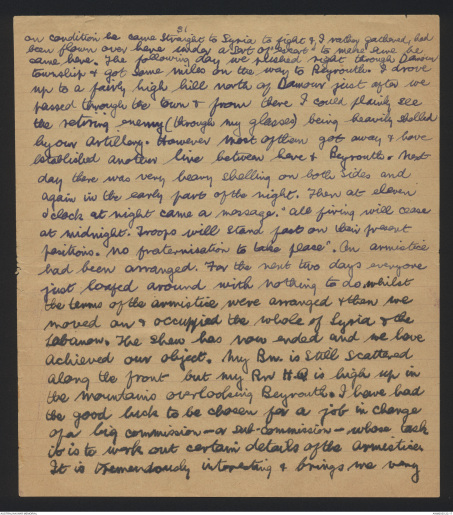
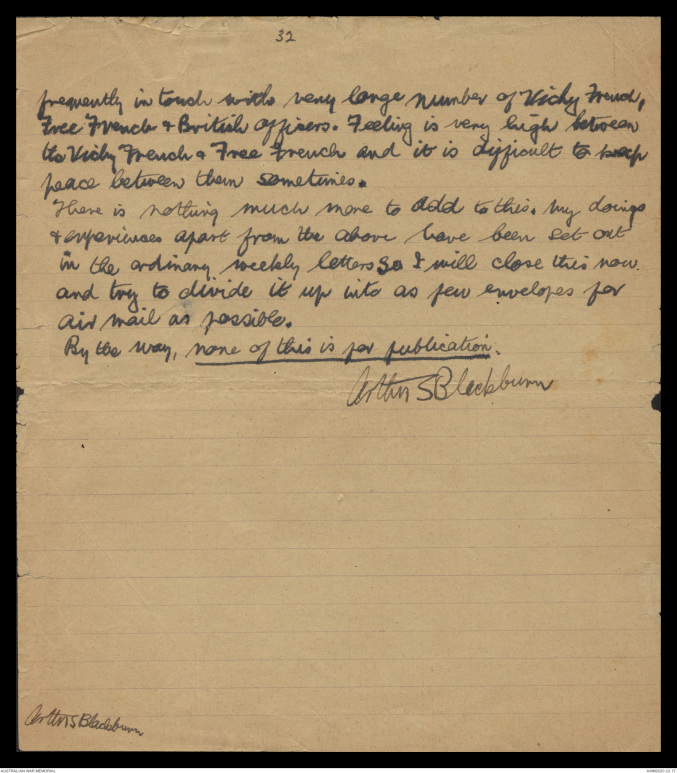
21
then two armored cars went into the place to see that all was
satisfactorily settled preparatory to a resumption of the march. Just
as they got in we saw a motor car coming down the street
waving a white flag, - the signal of surrender! It was
followed by a cab or two & several more cars. At the
time I was standing right in front with Col Co Casseau
and when I saw that I was the Senior British officer
present, I accompanied him forward to meet the surrendering
party. After a long talk in French - which I pretended to
understand, by taking my cue for agreement or otherwise
from the French Col, - we all got into our motor cars &
made our triumphal entry into Damascus. Believe me, it
was some moment. First came a motor car containing the
mayor of Damascus, then Col Casseau's car, then yours truly
in my motor car, then dozens of other minor dignitaries
such as staff officers etc. We drove up & down the
main streets amidst a certain amount of applause and a
tremendous lot of military presenting of arms - to all of
which I, of course, condescended to salute. We pulled up
first at the Town Hall, a magnificent big building in a
European style of architecture. Military guards at the door
admitted Col Casseau & myself & we met the Civic authorities
& formally accepted the surrender. We then moved on again
through a rapidly growing crowd to the Chief of Police
where we formally took over the control of the
Arthur S Blackburn
Lt Col A S Blackburn 2/3 MG Bn AIF Abroad
22
police, & then the military commander from whom we
accepted its capture surrender of the garrison - more presenting
of arms & more long speeches, accompanied by frequent
bows to me - and my acknowledgement of same in the
best possible fashion. Then came a special little
speech acknowledging the glories of Australia - so I gathered;
which I was pleased to accept (not understanding one word
of French) in a short speech in Australian - which they all
equally solemnly pretended to understand & accept!
Altogether it was really terribly funny considering (1) I was
for the moment representing the whole British army - and
hadn't the slightest idea what it was all about (2) the
whole ceremony was punctuated by frequent bows & salutes to
me (3) I had no right authority whatever to be present. However it was
also terribly thrilling, to be receiving the surrender of this
huge City of Damascus on behalf of the British Army whe knowing perfectly well that the local dignitaries fully
believed me to be the accredited representative of Britain. After
that followed a formal luncheon at the Club - & then about
4 o'clock in the afternoon the French general arrived, also
accredited representatives of the British Army - and my
glorious hour was ended! I formally handed over my
authority & once more reverted to the position of a Bn Commander.
In the next phase of the show in Syria, nothing very
exciting happened so far as I personally was concerned.
23
The special force which I had with me, was next attached to
a British Brigade & we took part in the capture of Qatana and
the fight up the Qatana pass to the Beyrouth - Damascus Road.
The fighting at times was fairly heavy but nothing unusual
happened, apart from ordinary incidents of war. I saw one
remarkable illustration of how close men can be to death &
yet escape unharmed. On the second morning of the fight up
the Qatana pass, we moved off before daylight & took up
a position in a gully ready to move on when a small hill
feature had been captured. Soon after daylight the enemy
evidently observed our vehicles - about 20 of them - dispersed
about the hillside & immediately opened fire with artillery.
The second or third shot landed fair & square on the
engine & bonnet of a truck in which two men were
seated. There was a terrific explosion & a sheet of
flame which set the truck on fire. Out tumbled the
two men like shot rabbits & rolled over & over down
the side of the hill. Both of them were all right, one
having a slight cut on the hand & the other a scratch in
the shoulder. Both were pl blasphemously indignant because
their personal gear had been burnt up in the truck!
After we go to the Beyrouth - Damascus Road we reached
a spot where further progress was almost impossible
and so we settled down to hold a defensive line
whilst the position was attacked elsewhere. After
24
I had co-ordinated the MG fire for the whole front at Damascus,
I returned to the central sector where I had other companies
engaged, and visited them to see their positions. One Coy - A from
S.A - was in a position at a place called Merdjayoun. This
town has been captured from the French, recaptured by the French
& again captured by us who now hold it. The enemy position
is now about 2 miles away & the town is intermittently shelled.
It had evidently been a rather fine town, with fine
stone buildings & tiled roofs. It is built on the top & side
of a prominent hill & had many beautiful gardens etc.
Unfortunately, in addition to the damage from shell fire, the
whole place was systematically looted by the enemy
soldiers - Moroccans & Foreign Legion - before they finally
got out. The residents - Lebanese & Syrians - are emphatic that
they (i.e. the French) actually put chains around stone supporting pillars
& verandah posts, trees etc & then fastened the chain to tanks
& deliberately set the tank in motion & pulled the buildings
down. In one shop I saw a big bon of cutlery spread
out on the floor & every knife & fork smashed with an
axe or some such implement. A big wireless set had an
axe still lying in it where it had been chopped up.
A pile several feet high in the middle of the floor
represented plates, glasses & other china & glass ware from
the shop. Evidently an effort had been made to burn
25
it all as straw was piled in the middle of the floor & was, I
understand, smouldering when the troops entered. I visited the
place again on 2/7/41 and it was really a most pitiable
sight. About two miles away there was another smaller but
similar town called Qleaa which had been very heavily
shelled but not looted. The inhabitants of both towns had
disappeared, probably to the gullys, during the fighting but had
now returned. In every house & yard, along every street &
road & in the gardens & orchards, were men, women & children
mourning over their household gods. In one verandah was
a wee little girl crying her heart out - over a mere broken
doll, whilst sitting in a chair alongside her sat an old, old
woman - granny I should think - with tears running down her
cheeks as she gazed at the indescribable confusion inside the
door. On their knees amongst the rubble, picking it over &
trying to find something worth salvaging were a man, a
woman & three children. All along the street were passing
a steady stream of people carrying, in the most fantastic
way, the most fantastic assortment of goods. Some had
bundles of bedding, pictures, ornaments, cups, broken chairs etc
balanced on their heads & shoulders (the universal method of
carrying in this country); others led donkeys or camels loaded
with sheets of galvanised iron, boards, bricks, wire, doors,
window frames, remains of furniture etc. All of them had
a ghastly pitiful look on their faces - and each of them
26
poor devils, gave one a ghastly grin, meant to be cheerful, & an
equally ghastly "Saida (good morning) Sir" or in some cases "good luck Sir" or in some cases "good luck Sir".
One knew perfectly well that sheer self interest would compel
them to say exactly the same & appear exactly as interested, in the enemy
if they recaptured the town. Poor, poor devils! we fight over
their country & ruin their homes, their crops, their orchards,
kill their sheep, cows & donkeys & often their sons & daughters,
& what, after all, have they to gain from it all. When
controlled by the French they tilled their miserable little
plots of garden or attended to their shops or business & if
they got their independance, will they be very different?
War, is really a hellish thing on the civil population, as
well as on the soldiers who are fighting & particularly
so when two other countries, France & Britain, fight over
the land of the Syrians. It is after all not much
consolation to them to know that we are invading the country
to stop the German invading it! Later on I went over to
the coast area where we are nearing Beyrouth. Once
again I passed up the road from Tyre to Sidon of this time
right through Sidon. Business is there much as usual
in spite of the occasional ruined house or shop from the
naval shelling. I then went on to a sector of the front
called Djezzine. It is high up in the mountains & it is
amazing how it was ever captured. It was apparently a
fashionable mountain resort from Beyrouth & Sidon
Arthur S Blackburn
AG Arthur S Blackburn 2/3 MG Bn AIF abroad
27
and is in the midst of beautiful vineyards, terrased gardens, &
cedar woods. The road leading into Djezzine runs along a steep hillside & is of the
"corkscrew" variety to a remarkable degree. Hair pin bends abound
& over & over you look over the side of the car & could drop
a stone into a car following along the next bend down.
The last mile or so is cut out of a sheer cliff face & is
at present rendered a bit exciting by the fact that it
is fully exposed to the enemy artillery about 8000 yds
away on another mountain. They amuse themselves by
taking pot shot at vehicles travelling along the road.
However, they were sports when I drove along as they didn't
have one shot at my car either going or coming, although
they dropped a couple of dozen shells into the town whilst
I was there. In Djezzine I saw a good illustration of the
appalling damage which one big bomb can do. The day
after we captured it, a large number of troops were in
a cafe - three storied - on the ground floor when an
enemy plane came over & dropped a big bomb which
hit the cafe. It not only wrecked the three floors but
dug a crater fully twenty feet deep. Nineteen men
were killed but fortunately none of my Bn. On
the way back I took a deviation road up which
the troops attacked so as to get an idea of what
they did. One of my Platoons drove their vehicles up
it in the dark & rushed their guns into the town.
28
The road has now received attention from the engineers for two or
three days & I am assured is immensely improved. We went along
in broad daylight and with no fear of suddenly running into an
enemy force. In spite of this we could never once get over
ten miles per hour & over & over again had to practically
stop to negotiate portions of it. At places it is the bare
width of the wheels - certainly not 18 inches to spare over
all - with a drop down to steep rocky hill into a
creek. Three times the bends were so sharp that we
could not negotiate them on one lock - every vehicle has
to back & fill to get around these corners - quite often
the car had to be put into bottom gear to hold it down
the steep grades & twice it crosses water ways & creeks
which are little more than swamps. Nevertheless the
vehicles on the night of the attack arrived there exactly on time on the night
of the attack having gone along without lights
in the dark. Ever since then this company of my Bn has
been stationed in Djezzine with the Infty Brigade there.
They have been quietly & steadily pushing forward
and are now quite a long in advance of the
town. Each push forward means a climb down a
very steep hillside, a climb up an equally steep one
on the other side & then a bit of a fight at the
end of it, if the enemy have not already got
out. The main trouble on that sector is shell fire
as the enemy shell the town and the roads fairly frequently.
29
The whole position settled down after Damascus to a short period
of comparative quiet and then, as the next move was to be on
Beyrouth, I moved my H.Q to a position close to the Ramour River,
the main defences of Beyrouth. I had one company (D) from
W.A. attached to the Brigade which was to make an attack on
the Damour defence and try to cross the River. I got up there
some time after the attack and when the River crossings had been succeeded. It must have been a marvellous piece of
work. It was carried out by the 16th Bn from W.A. & the 27th from
S.A. The 16th Bn attacked along the cop comparatively flat ground
along the coast & the 27th Bn further east in the mountainous
country so as to get behind the town of Damour & outflank the
enemy. The Damour river runs along a very steep gorge.
There was a big stone bridge near the coast but this
had been blown up by the enemy. To give an idea
of the nature of the country over which the attack took
place - that is in the mountain country- the 27th Bn, with
some of my machine gunners attached, moved in the early
part of the evening to a high ridge on our side of the
River. My men had been issued with mules upon
which to load their machine guns & ammunition, as
it was almost beyond human indurance to carry
them up & down the hills. They ( i.e. the whole attacking force) then filed, in single
file, down a goat track into the gorge, crossed the
River by wading it & then climbed up the other
side of the gorge by another goat track & attacked
30
the enemy on the other side. When I visited the place to see how
things were going & discuss the machine gun side of it, I drove in
my car along a track alongside the river, as by then we had captured
the crossings and the engineers had pushed a pontoon bridge across.
The only enemy fire there then was artillery fire as they had
been pushed too far back to reach the pontoon & the road along
the gorge by other fire. I drove to the foot of the goat track on
the enemy side of the river up which the Infantry had advanced
in the dark carrying their rifles, ammunition, bombs, etc & then
fought & beaten the enemy. I carried nothing but a revolver
field glasses and a map case and went up the track, which
had been improved in places, in broad daylight, just as the
sun was rising. It took me even under those conditions
nearly an hour to reach the top & I was pretty well
knocked out when I got there - and yet, as I said, the
Infantry climbed it in the dark & then attacked & captured
well prepared enemy defences! The following night
about nine o'çlock a batch of nearly 200 French
prisoners came down past my H.Q & stopped there
for a time. One of their officers told me he had
flown out from France nine days earlier to fight
over here, but I think he was very glad to have
been captured. He had already been captured once
by the Germans when they invaded France, so was quite
used to the procedure. He had been released, so he said
31
on condition he came straight to Syria to fight & I rather gathered, had
been flown over here under a sort of 'escort' to make sure he
came here. The following day we pushed right through Damour
township & got some miles on the way to Beyrouth. I drove
up to a fairly high hill north of Damour just after we
passed thought the town & from there I could plainly see
the retiring enemy (through my glasses) being heavily shelled
by our artillery. However most of them got away & have
established another line between here & Beyrouth. Next
day there was very heavy shelling on both sides and
again in the early part of the night. Then at eleven
o'çlock at night came a message. "All firing will cease
at midnight. Troops will stand fast on their present
positions. No fraternisation to take place". An armistice
had been arranged. For the next two days everyone
just loafed around with nothing to do whilst
the terms of the armistice were arranged & then we
moved on & occupied the whole of Syria & the
Lebanon. The show has now ended and we have
achieved our object. My Bn. is still scattered
along the front but my Rn H.Q is high up in
the mountains overlooking Beyrouth. I have had
the good luck to be chosen for a job in charge
of a big commission - or sub-commission - whose task
it is to work out certain details of the Armistices.
It is tremendously interesting & brings me very
32
frequently in touch with very large number of Vichy French,
Free French & British officers. Feeling is very high between
the Vichy French & Free French and it is difficult to keep
peace between them sometimes.
There is nothing much more to add to this. My doings
& experiences apart from the above have been set out
in the ordinary weekly letters so I will close this now
and try to divide it up into as few envelopes for
air mail as possible.
By the way, none of this is for publication.
Arthur S Blackburn
Arthur S Blackburn
 Jacqueline Kennedy
Jacqueline KennedyThis transcription item is now locked to you for editing. To release the lock either Save your changes or Cancel.
This lock will be automatically released after 60 minutes of inactivity.